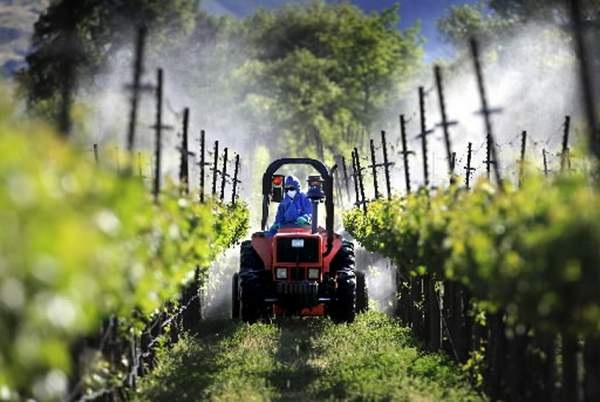UK Vineyards Close To Amber Warning Over Pesticides
Date£º
2016-05-11 14:28 Source£º
thedrinksbusiness Author:
Barnaby Eales Translator:
Britain¡¯s burgeoning wine industry is facing a new ¡°catastrophic¡± scenario over a failure to replace pesticide products whose approval has been revoked, the UK Vineyards Association (UKVA) as warned.

A vineyard being sprayed with pesticides
¡°The toolbox is rapidly diminishing and at the same time resistance to the ones in use [mainly herbicides and fungicides] is growing; we are heading towards a catastrophically high risk scenario,¡± Chris Cooper, the UKVA¡¯s pesticides expert said.
Cooper has designed a UKVA Pesticides Graphic Tool specifically to show how the situation has worsened. The Pesticides Graphic Tool illustrates indicators with a colour scheme in which green is safe and red is severe. The UK is currently lies between yellow and amber but Cooper said it was faced with the prospect of entering a ¡®high risk¡¯ amber scenario.
¡°Only two years ago we would be have been between yellow and green, but now we are heading towards amber,¡± Cooper warned. He blamed the lack new chemical products on manufacturers who do not want to pay for the expenditure of research into the nature of products, required for product approval.
The situation means producers are facing a rise in costs with further measures required to deal with the lack of chemicals to combat disease and weeds. the UKVA said. It has forced the UK wine industry to look at alternative practices in viticulture sparking a debate over the practicalities and economics of organic production in a cool climate.
According to the English Wine Research Development Group (EWRD), which is formed leading English wine producers and researchers, the issue of chemicals in now the central problem facing the wine industry in the UK.
EWRD chairman Chris Foss, who is head of wine at Plumpton College, said: ¡°We need to wean ourselves off pesticides in the long term. In the short term, this will be difficult because we are used to using them,¡± he said.
Plumpton College is carrying out trials on newly formed disease resistant grape varieties made in Germany and Switzerland from crossings of grape varieties.
It is also doing trials on a perennial ¡®green mulch¡¯ a type of plant that would be able to occupy the space of weeds.
UK vineyards use herbicides and fungicides to cope with weeds and Powdery and Downy Mildew. Weeds are a particularly acute issue in Britain¡¯s cool climate.
In May, a European Committee is expected to decide on European Commission proposal to restrict the use of Glyosphate. The herbicide is widely used on vineyards in Britain to combat weeds. Although, the vast majority of vineyards in Britain use chemicals, Biodynamic producers including the award-winning Ancre Hill Estates in Wales, have provided evidence that it is possible on certain sites, to produce quality wine without using pesticides.
¡°By using pesticides you are killing the micronutrients and organisms in the soil. This means that although, you may have a good level of Magnesium for example in the soil, the use of pesticides means the vines are not able to get access to it,¡± said David Morris, winemaker at Ancre Hill Estates. Morris, one of the rising stars of viticulture in Britain, is the former vineyard supervisor at Nyetimber. He worked four years at the estate in Sussex, which uses conventional farming. His experience of conventional farming led him to opt for biodynamic practices.
Conventional producers using pesticides say a loss of yields and therefore, the amount of wine produced for sale, is one of the key criticisms of organic production.
But organic producer Will Davenport, owner and producer at Davenport Vineyards in East Sussex, denied this saying: ¡°We get roughly the same or better yields than most non-organic vineyards. The only reason for an organic vineyard to yield lower would be if the grower had failed to control mildew.
¡°This would result in a percentage of diseased fruit having to be discarded or removed as disease develops over the summer. If mildew is prevented, I can see no reason for an organic vineyard to have a reduced crop, assuming that weeds are controlled and soil fertility is managed well,¡± he said.
Other organic producers admit that up to 50% of yields can be lost but they argue they consistently get better quality grapes. They argue, that controlling weeds is the main problem when it comes to viticulture in Britain and that conventional producers are put off by the labour costs.
English wine expert and consultant, Stephen Skelton MW, a minor investor in the Taittinger-controlled Domaine Evremond in Kent, has ruled out organic production for the site.
¡°Domaine Evremond has been planned to be a commercial operation with the aim to repay investors over the next 20 years. Our costs have been carefully budgeted and rely upon getting certain yields to meet the targets. It is most certainly not a vanity project (I speak as one of the minor investors) and there is too much risk in farming in any other way than that all of our UK-based competitors,¡± he said.
¡°Of course not all organic or biodynamic vineyards are the same and there are a few that are better than others, but in the main, this is true,¡± he added.